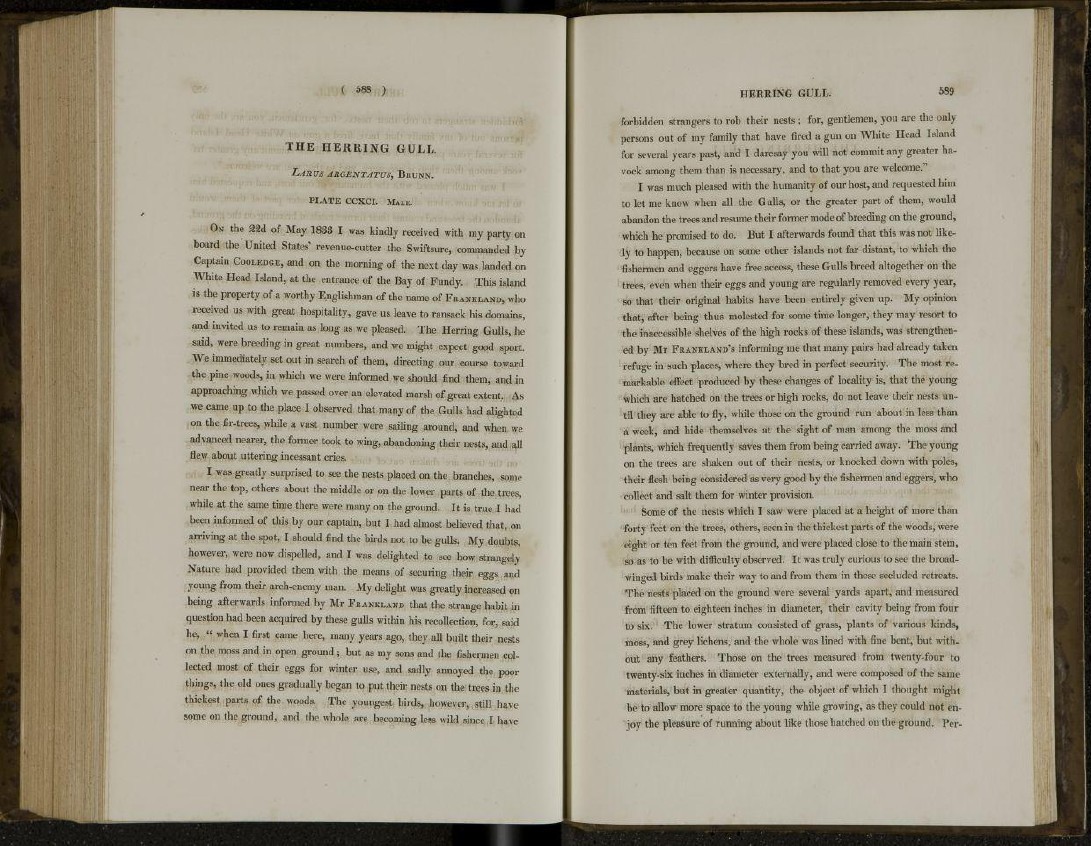
( 588 )
THE H E R R I N G GULL.
LARUS ARGENTATUS, BRUNN.
PLATE CCXCI. MALE.
ON the 22d of May 1 8 3 3 I was kindly received with my party on
board the United States'1 revenue-cutter the Swiftsure, commanded by
Captain COOLEDGE, and on the morning of the next day was landed on
White Head Island, at the entrance of the Bay of Fundy. This island
is the property of a worthy Englishman of the name of FRANKLAND, who
received us with great hospitality, gave us leave to ransack his domains,
and invited us to remain as long as we pleased. The Herring Gulls, he
said, were breeding in great numbers, and we might expect good sport.
We immediately set out in search of them, directing our course toward
the pine woods, in which we were informed we should find them, and in
approaching which we passed over an elevated marsh of great extent. As
we came up to the place I observed that many of the Gulls had alighted
on the fir-trees, while a vast number were sailing around, and when we
advanced nearer, the former took to wing, abandoning their nests, and all
flew about uttering incessant cries.
I was greatly surprised to see the nests placed on the branches, some
near the top, others about the middle or on the lower parts of the trees,
while at the same time there were many on the ground. It is true I had
been informed of this by our captain, but I had almost believed that, on
arriving at the spot, I should find the birds not to be gulls. My doubts,
however, were now dispelled, and I was delighted to see how strangely
Nature had provided them with the means of securing their eggs and
young from their arch-enemy man. My delight was greatly increased on
being afterwards informed by Mr FRANKLAND that the strange habit in
question had been acquired by these gulls within his recollection, for, said
he, " when I first came here, many years ago, they all built their nests
on the moss and in open ground ; but as my sons and the fishermen collected
most of their eggs for winter use, and sadly annoyed the poor
things, the old ones gradually began to put their nests on the trees in the
thickest parts of the woods. The youngest birds, however, still have
some on the ground, and the whole are becoming less wild since I have
HERRING GULL. 589
forbidden strangers to rob their nests; for, gentlemen, you are the only
persons out of my family that have fired a gun on White Head Island
for several years past, and I daresay you will not commit any greater havock
among them than is necessary, and to that you are welcome."
I was much pleased with the humanity of our host, and requested him
to let me know when all the G ulls, or the greater part of them, would
abandon the trees and resume their former mode of breeding on the ground,
which he promised to do. But I afterwards found that this was not likely
to happen, because on some other islands not far distant, to which the
fishermen and eggers have free access, these Gulls breed altogether on the
trees, even when their eggs and young are regularly removed every year,
so that their original habits have been entirely given up. My opinion
that, after being thus molested for some time longer, they may resort to
the inaccessible shelves of the high rocks of these islands, was strengthened
by Mr FRANKLAND'S informing me that many pairs had already taken
refuge in such places, where they bred in perfect security. The most remarkable
effect produced by these changes of locality is, that the young
which are hatched on the trees or high rocks, do not leave their nests until
they are able to fly, while those on the ground run about in less than
a week, and hide themselves at the sight of man among the moss and
plants, which frequently saves them from being carried away. The young
on the trees are shaken out of their nests, or knocked down with poles,
their flesh being considered as very good by the fishermen and eggers, who
collect and salt them for winter provision.
Some of the nests which I saw were placed at a height of more than
forty feet on the trees, others, seen in the thickest parts of the woods, were
eight or ten feet from the ground, and were placed close to the main stem,
so as to be with difficulty observed. It was truly curious to see the broadwinged
birds make their way to and from them in these secluded retreats.
The nests placed on the ground were several yards apart, and measured
from fifteen to eighteen inches in diameter, their cavity being from four
to six. The lower stratum consisted of grass, plants of various kinds,
moss, and grey lichens, and the whole was lined with fine bent, but without
any feathers. Those on the trees measured from twenty-four to
twenty-six inches in diameter externally, and were composed of the same
materials, but in greater quantity, the object of which I thought might
be to allow more space to the young while growing, as they could not enjoy
the pleasure of running about like those hatched on the ground. Per